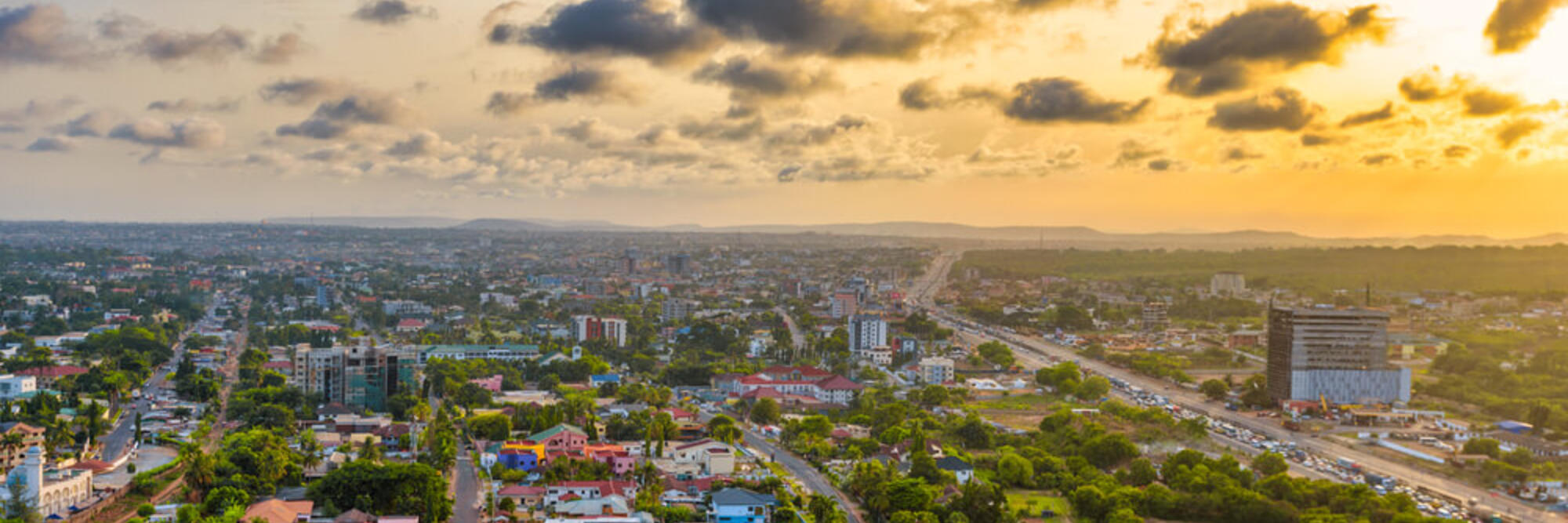 "My name is Carsten, and I am a German citizen, currently 21 years old. After graduating from German High School, I decided to apply to the Weltwärts programme of the German Ministry of Economic Cooperation and Development, a programme aimed to send young people to developing countries for long-term volunteering.
"My name is Carsten, and I am a German citizen, currently 21 years old. After graduating from German High School, I decided to apply to the Weltwärts programme of the German Ministry of Economic Cooperation and Development, a programme aimed to send young people to developing countries for long-term volunteering.
Employed by the German Red Cross, I lived in a rather small Ghanaian city and taught ICT in a local primary and junior high school. I also worked for a regional NGO and in my holidays visited Sierra Leone for several weeks. All in all, I lived in Ghana from September 2010 to August 2011."
Read more about Ghana in the Expat Arrivals Ghana country guide, or read more about expat experiences in Ghana.
About Carsten
Q: Where are you originally from?
A: I was born and raised in Germany.
Q: Where did you live in Ghana?
A: I lived in Agona Swedru (Central Region, roughly 60,000 inhabitants), a busy trading hub about one hour's drive from the capital Accra and a drive of two hours from the regional capital Cape Coast.
Q: How long did you live there?
A: I lived in Ghana for approximately one year.
Q: Why did you move; what did you do?
A: I participated in a volunteering program for young people (mainly high school graduates like me) financed by the German government and worked as a primary and high school teacher for the German Red Cross Society.
About Ghana
Q: What did you enjoy most about Agona Swedru, how’s the quality of life?
A: The city is very busy, other volunteers based in quiet and beautiful cities such as Koforidua or Akwatia described it as noisy and dirty, but personally, I actually liked the lively environment. The quality of life all depends on personal wealth and location, several kinds of estates are available (mostly walled). Water shortages and blackouts are common but can be avoided by the use of standby generators and private wells. Since many locals make their living in farming, you always find fresh vegetables and fruits for very cheap prices. In fact, as a volunteer, you are used to a lower standard of living and I do not believe that for most Europeans, Swedru would be the place to be, besides for them there would rarely be a reason to live there.
Q: Any negatives? What did you miss most about home?
A: Swedru mostly lacks products and brands most Europeans ask for, but locally made goods and imports from Asia (mainly China) substitute most of it. A supermarket of Western style (Shoprite) is located close to Accra (roughly 1.5 hours' drive away) and features everything you need, including chocolate, cheese, juices etc. Unfortunately, Swedru, as a Ghanaian town rarely frequented by European tourists or businessmen, offers nothing of any cultural importance such as theatres, cinemas or similar. For major entertainment, Accra is the only escape.
Q: Is the city safe?
A: It is as safe as any other medium-sized Ghanaian city. Crime does exist but does not really interfere with daily life. I have heard of several violent housebreakings, especially in wealthy areas, but they are rather rare. Hold-ups are more common in areas frequently visited by tourists, such as Krokrobitey Beach and Osu in Accra. The local police are quite ineffective and out-and-out corrupt, a standard bribery is expected at every police barrier.
Q: Describe an ideal way to spend a weekend in the city.
A: Swedru itself has little to offer, among the few attractions are the Greenland Hotel featuring tennis courts, a pool and continental food; several spots (local pubs) and beautiful little villages in the surroundings. Most Europeans like to spend time at the picturesque beaches of Winneba (a drive of half an hour) or head for Accra to visit the Mall, Osu or clubs and restaurants. Personally, I liked to watch football games in Accra's national stadium, the admission being very cheap. Another possible destination is the regional capital Cape Coast (a drive of 2 hours), offering the historic castle and beaches.
About living in Ghana
Q: Which are the best places/suburbs to live in the city as an expat?
A: Mainly the outskirts: Woraba or the area around the Greenland Hotel since they are quiet, less populated and mainly inhabited by locals of a higher social level (a lot of walled estates). Bear in mind that the lanes in these areas are still not tarred and very rough, as is every lane in Swedru except for the main streets.
Q: How do you rate the standard of accommodation?
A: Since I lived with a Ghanaian family and every volunteer is required to adapt to the local lifestyle, I can hardly make any comments about it. From what I know, accommodation of a high standard (i.e. warm water, electricity, air conditioning, huge garden etc.) is available.
Q: What’s the cost of living compared to home? What is cheap or expensive in particular?
A: As a rule of thumb, local products and those imported from China are very cheap, whilst high-quality imports from the US and Europe are rather expensive. Much depends on your talent in bargaining, for Ghanaians love haggling. As an obruni (white person) prepare to be charged much more than locals since white people are always considered rich. Showing that you are a resident and experienced in haggling is always helpful, for it makes most vendors drop the surcharge. Compared to Europe, public transport, electricity, water and local food are very cheap.
Q: What are the locals like; do you mix mainly with other expats?
A: On average, locals are very open and friendly. That is even increased by you being white, since a white friend is regarded as some kind of prestige object for many Ghanaians. Therefore it can be difficult to determine whether someone is interested in you as a person or as the big white friend. Since there were numerous international volunteers in Swedru I spent most time with some of them but also made good friends with locals, namely fellow teachers, my boss in a small NGO and the host brother of another volunteer.
Q: Was it easy meeting people and making friends?
A: Saying that meeting people is “easy” would be the understatement of the century – it is rather unavoidable. Everyone wants to make contact with you, people at the roadside are shouting “Obruni!” and you are constantly approached. As described above, making true friends is fairly difficult but not impossible either.
Q: What is overrated and underrated about your city?
A: Basically, there is no rating of Swedru since it is totally unknown except among former volunteers. One travel guide states that Swedru has a wood market selling beautiful art. In fact, such a market does not exist and never has.
About working in Ghana
Q: Did you have a problem getting a work visa/permit?
A: It was organised by my organisation, so I was not involved in the process, but apparently there were some major problems and delays caused by the bureaucracy.
Q: What’s the economic climate like?
A: Swedru is constantly growing, the small local supermarket (Melcom) just recently expanded its space, but except for volunteering there will be few to do for highly qualified, international employees. The city's importance is just too low.
Q: How does the work culture differ from home?
A: GMT = Ghana Maybe Time. That pretty much sums it up. The very formal speaking habits and dress code (whose idea was it to export the suit to Africa?!) are parodied by a total lack of punctuality. If a meeting is scheduled at a certain time, you can expect it to start one hour later. Or two. Or three. Or tomorrow. Or not at all. Again, this is what happened with our volunteer organisation, within my school and the NGO. Huge companies based in Accra or Kumasi might have totally different working habits, yet the aforementioned pretty much dominates the whole daily life.
Q: What are the schools like, any particular suggestions?
A: As I was teaching in a local school, I may have a deeper and more profound insight into the Ghanaian education system than others. Expats from the US or Europe will certainly not want to enrol their children in a public school since the standard of teaching is usually very low (though it gets better at the secondary level) and corporal punishment, although officially abandoned, is ubiquitous. Fortunately, Accra offers some excellent schools (Ghana International School etc.) aimed to provide education for children of diplomats and expats, some of them even offering the International Baccalaureate. I am not sure, but Kumasi, Tamale and Sekondi-Takoradi should also have some sound schools.
Q: How would you rate the healthcare?
A: Agona Swedru has one government hospital which I would only recommend to be attended for cases of malaria or minor injuries, since stories of patients waking up in the midst of surgery and two doctors having to care for more than 100,000 people in the municipality prevent any wishes of staying overnight. For more severe cases, there are very good hospitals in Accra, namely Korlebu University Hospital and the 37 Military Hospital (both also offering MRT services). Since the German embassy has two skilled doctors, I suppose other European and American embassies can also provide healthcare of a similar high standard. For a small fee, you can register with the West African Rescue Association (WARA), a company offering emergency healthcare and evacuation of European standards in case of emergencies.
And finally…
Q: Is there any other advice you like to offer new expat arrivals?
A: In the end, some pieces of advice:
- Public transport (mainly tro-tros) is very cheap and lots of fun! Just bear in mind that, due to hazardous drivers and poorly maintained vehicles, it can be dangerous as well, so if you do not want to find yourself frontally crashing into the oncoming traffic (as I did), rather rely on private vehicles. Ghana's traffic is said to be among the most dangerous in the world! Especially in Accra, traffic jams are common, not so much in the city centre but rather in the outskirts.
- Keep a critical eye! Ghanaians are usually seen as a bunch of open-minded and very friendly people, but that does not necessarily mean that they are that tolerant among each other too. From my experience, many Ghanaians enjoy gossiping and tend to have numerous prejudices – all in all, they are simply just humans.
- Try the local food. Fufu is definitely overrated but Jollof Rice, Banku and Tilapia are certainly worth tasting. I consider most of the overcautious rules propagated in travel guides to be exaggerated, from the very beginning, I ate in shabby chop bars (small fast food restaurants only consisting of a wooden hut and two or three 'meals' offered), drank pure water (water filled in plastic bags and considered anything but 'pure') and never encountered any problems. As long as you do not share a dish with people in the hospital's tuberculosis wards, you'll be fine. Yet, to spare your stomach, it is recommended to abstain from salad and local food in the first couple of weeks since your immune system needs some time to adapt to the new environment.
So if you follow some basic rules, use common sense and encounter anyone open-minded and tolerant, you are going to have a great time in Ghana!
► Interviewed January 2012



